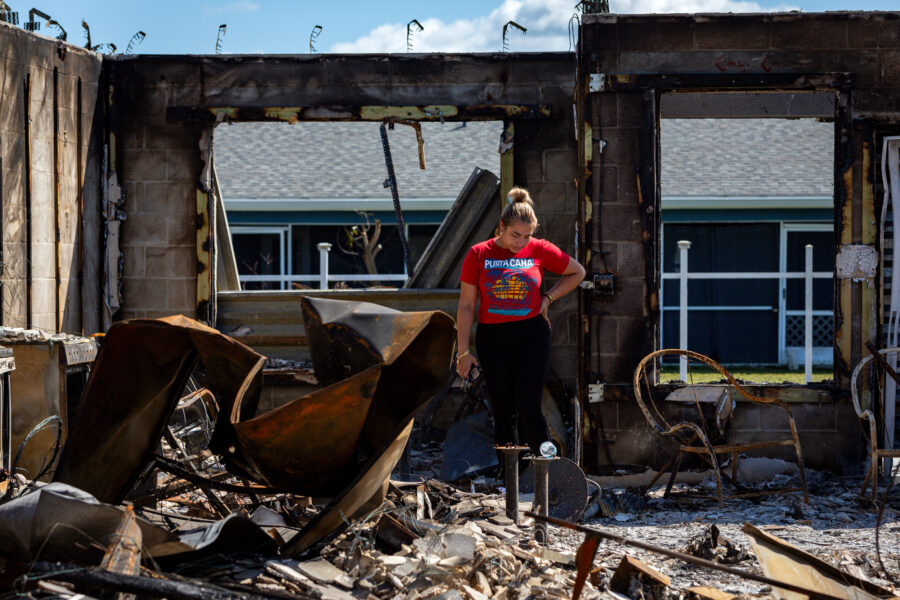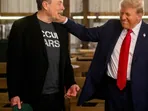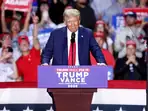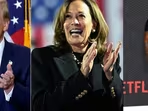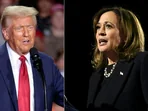Second Republican Debate tonight: Here are 5 points to ponder
Republican presidential candidates are all set to meet for a high stake debate on Wednesday on the back of auto workers strike, looming government shutdown, Donald Trump's rising legal troubles and a renewed focus on abortion rights.
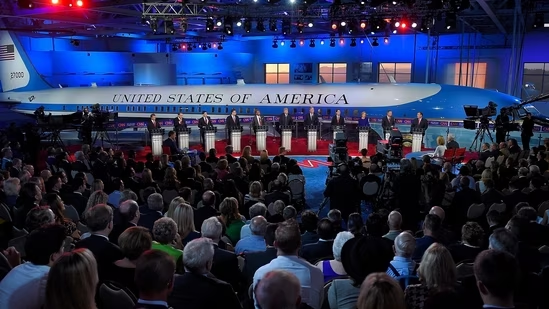
The event, scheduled to commence at 9 p.m. New York time in Simi Valley, California, is expected to refocus attention on critical issues concerning immigration and border security. It will also offer candidates an opportunity to set themselves apart from the competition and pose a significant challenge to former President Donald Trump. Notably, frontrunner, Trump, has once again chosen to forgo participation.
We're now on WhatsApp. Click to join.In Trump's absence all eyes will be on key figures such as businessman Vivek Ramaswamy, former UN Ambassador Nikki Haley, and former Vice President Mike Pence, who are expected to deliver passionate performances that previously bolstered their visibility and polling numbers. Florida Governor Ron DeSantis and South Carolina Senator Tim Scott will also have a chance at redemption following their relatively lackluster showings in last month's debate in Milwaukee.
Also Read: Republicans face critical debate as rivals seek to dent Trump's momentum
Can Ramaswamy and Haley outshine for the second time?
Nikki Haley and Vivek Ramaswamy emerged with glowing reviews following the inaugural GOP primary debate last month, according to a recent poll conducted by FiveThirtyEight, The Washington Post, and Ipsos. Haley emphasized her conservative credentials while positioning herself as a proven leader rather than a provocateur. On the other hand, Ramaswamy engaged in spirited exchanges with fellow candidates, aiming to bolster his outsider image.
As the second primary debate approaches, both candidates find themselves in the pivotal position of maintaining their momentum. "A strong performance is essential, and they can't afford to stumble, either literally or figuratively, during the debate. Both of them must match or exceed their previous performances," emphasized Dave Carney, a GOP strategist based in New Hampshire.
However, their strong showing in the last debate may encourage other candidates to elevate their game on Wednesday night, potentially directing their criticisms toward Haley and Ramaswamy.
For Ramaswamy, who garnered attention for his confrontational approach with fellow candidates and his calls for comprehensive federal government reforms, GOP strategist Bob Heckman noted that voters may now be looking for more substantial policy proposals.
Last chance for redemption for DeSantis
Is Florida Governor most viable alternative to Donald Trump? Amid slumping poll numbers and donor skepticism it will be a high stake debate for Ron DeSantis after he largely ceded the spotlight to rivals last month. Florida Governor is currently trailing Trump by 42.5 percentage points in the RealClearPolitics polling average. DeSantis campaign has even sent a memo to donors Saturday to reassure them of the governor’s chances.
Trump’s absence again positions DeSantis as the leading contender on stage. Last time around, he finished in the middle of the pack in terms of speaking time, and his opponents largely directed their fire elsewhere. The challenge now for DeSantis is to avoid a repeat of that dynamic, lest his campaign slip further toward mixing with the rest of the field.
Also Read: All About 2nd GOP debate: When is it scheduled and will Trump attend
GOP position on key issues: Government shutdown, UAW Strike, Immigration
The impending government shutdown, UAW strike and immigration are poised to take centre stage as the dominant policy topics during Wednesday night's GOP debate. Moderator Stuart Varney emphasized their commitment to addressing a broad spectrum of issues, stating that “we will thoroughly cover all the key topics, as that's what the audience expects.”
Furthermore, Republicans both within and outside of Capitol Hill are capitalizing on the surge in unauthorized border crossings to critique the Biden administration's immigration policies. Given that many of the candidates lack current federal positions and share similar stances on border security, it remains uncertain how distinct their perspectives on spending and immigration will be.
Can Tim Scott Make an Impact?
Tim Scott faces a challenge similar to that of Ron DeSantis. Although he entered the first debate with a boost in fundraising and polling numbers, he was unable to capitalize on that momentum. In fact, only North Dakota Governor Doug Burgum and former Arkansas Governor Asa Hutchinson spoke less during the debate, and Hutchinson didn't qualify for the second debate.
Expect Tim Scott to try and distinguish himself on the topic of abortion. He has openly criticized Trump's stance, suggesting that the former president might relax the 15-week national abortion ban, a policy that Scott strongly supports. Just this Monday, Scott released an advertisement accusing fellow Republicans of showing signs of "retreating on life."
Is this final stretch for such a crowded stage?
Following the first debate, the stage has only seen a reduction of one candidate, with Hutchinson failing to meet the qualifications for Wednesday's event. However, political strategists anticipate a significant narrowing of the field by the time the third debate arrives in November.
To earn a spot in that upcoming debate, candidates must secure a minimum of 4% support in two national polls or reach 4% in one national poll and 4% in a poll from one of the early-state "carve out" states approved by the Republican National Committee, including Iowa, New Hampshire, Nevada, and South Carolina. This marks a 1% increase in polling requirements compared to the second debate, where candidates needed 3% in three national polls or 3% in two national polls along with 3% in two early-state polls.
Furthermore, candidates are now mandated to garner a minimum of 70,000 unique donors for entry into the third debate, a significant increase from the 50,000 unique donor threshold for the second debate. They must also secure at least 200 unique donors per state or territory in a minimum of 20 states and/or territories.


Disclaimer: The copyright of this article belongs to the original author. Reposting this article is solely for the purpose of information dissemination and does not constitute any investment advice. If there is any infringement, please contact us immediately. We will make corrections or deletions as necessary. Thank you.
Title:Second Republican Debate tonight: Here are 5 points to ponder
Url:https://www.investsfocus.com

